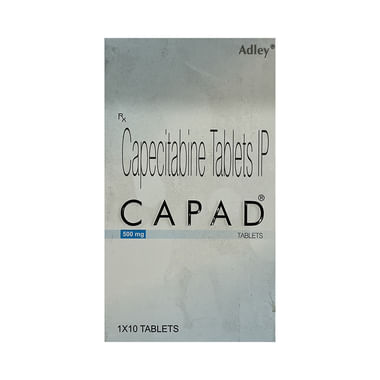-
Capekast Tablet (Rs.672.19)
Composition: Capecitabine (500mg)
-
Ericap 500mg Tablet (Rs.1183.13)
Composition: Capecitabine (500mg)
-
Capiibine 500mg Tablet (Rs.3166)
Composition: Capecitabine (500mg)
-
Naprocap 500mg Tablet (Rs.1500)
Composition: Capecitabine (500mg)
-
Atubri 500mg Tablet (Rs.1730.77)
Composition: Capecitabine (500mg)
-
Pecitabin 500mg Tablet (Rs.1153.13)
Composition: Capecitabine (500mg)
-
Prexita 500mg Tablet (Rs.1350)
Composition: Capecitabine (500mg)
-
Zenocite 500mg Tablet (Rs.981.77)
Composition: Capecitabine (500mg)
-
Zocitab 500mg Tablet (Rs.1542.4)
Composition: Capecitabine (500mg)
All Details About Capad Tablet
Find out detailed description, uses, directions of use, side effects, warnings and precautions, frequently asked questions about Capad Tablet
Description:
Capad Tablet is used in the treatment of cancer of breast, colon, and rectum. It may be also used to treat other conditions, as determined by the doctor. It is used alone or in combination with some other medicine as a part of chemotherapy.Capad Tablet should be taken with food within 30 minutes after eating a meal. Your doctor will decide what dose is necessary and how often you need to take it. This will depend on what you are being treated for and may change from time to time. You should take it exactly as your doctor has advised. Taking it in the wrong way or taking too much can cause very serious side effects. It may take several weeks or months for you to see or feel the benefits but do not stop taking it unless your doctor tells you to.
The most common side effects of this medicine include vomiting, weakness, nausea, abdominal pain, and diarrhea. This medicine may reduce the number of blood cells (decrease white blood cells) in your blood, thereby, increasing the susceptibility to infections. Regular blood tests are required to check your blood cells along with heart, liver, and blood uric acid levels.
Earlier taking it, tell your doctor if you have liver, or kidney problems or are taking any medicines to treat infections. Many other medicines can affect, or be affected by, this medicine so let your doctor know all medications you are using. This medicine is not recommended during pregnancy or while breastfeeding. The use of effective contraception by both males and females during treatment is important to avoid pregnancy.
Directions For Use:
Take this medicine in the dose and duration as advised by your doctor. Swallow it as a whole. Do not chew, crush or break it. Capad Tablet is to be taken with food.Side Effects:
Most side effects do not require any medical attention and disappear as your body adjusts to the medicine. Consult your doctor if they persist or if you’re worried about themOrdinary side effects of Capad
- Dehydration
- Constipation
- Eye irritation
- Nausea
- Anemia (low number of red blood cells)
- Hand-foot syndrome
- Fever
- Pain
- Chubbyigue
- Vomiting
- Diarrhea
- Paresthesia (tingling or pricking sensation)
- Weight loss
- Stomatitis (Inflammation of the mouth)
- Hair loss
- Pantingness
- Low blood platelets
- Decreased appetite
- Decreased white blood cell count (neutrophils)
- Edema (swelling)
- Increased bilirubin in the blood
- Abdominal pain
Warning & Precautions:
Employ of Capad Tablet is not recommended in patients with severe kidney disease.
Employ of Capad Tablet is not recommended in patients with severe kidney disease.
FAQs:
Should Capad Tablet be taken with or without food?
Do I need to use birth control method while using Capad Tablet?
How long do I need to take Capad Tablet?
What are the side effects of Capad Tablet?
Does Capad Tablet make you tired?
What is the most important information that I should know about Capad Tablet?
What kind of drug is Capad Tablet?
Do I need to get any tests done while on Capad Tablet?
What are the serious side effects of Capad Tablet?
Written by:
Dr. Lokanish
M.B.B.S.
Reviewed by:
Dr. Sureshbabu Yadav
M.B.B.S., DIP.DIAB, F.R.S.H
Disclaimer:
Getomeds primary intention is to ensure that its consumers get information that is reviewed by experts, accurate, and trustworthy. The information and contents of this website are for informational purposes only. They are not intended to be a substitute for professional medical advice, diagnosis, or treatment. Please seek the advice of your doctor and discuss all of your concerns about any disease or medication. Do not disregard or postpone seeking professional medical advice because of something you read on Getomeds. Our mission is to support, not replace, the doctor-patient relationship.
